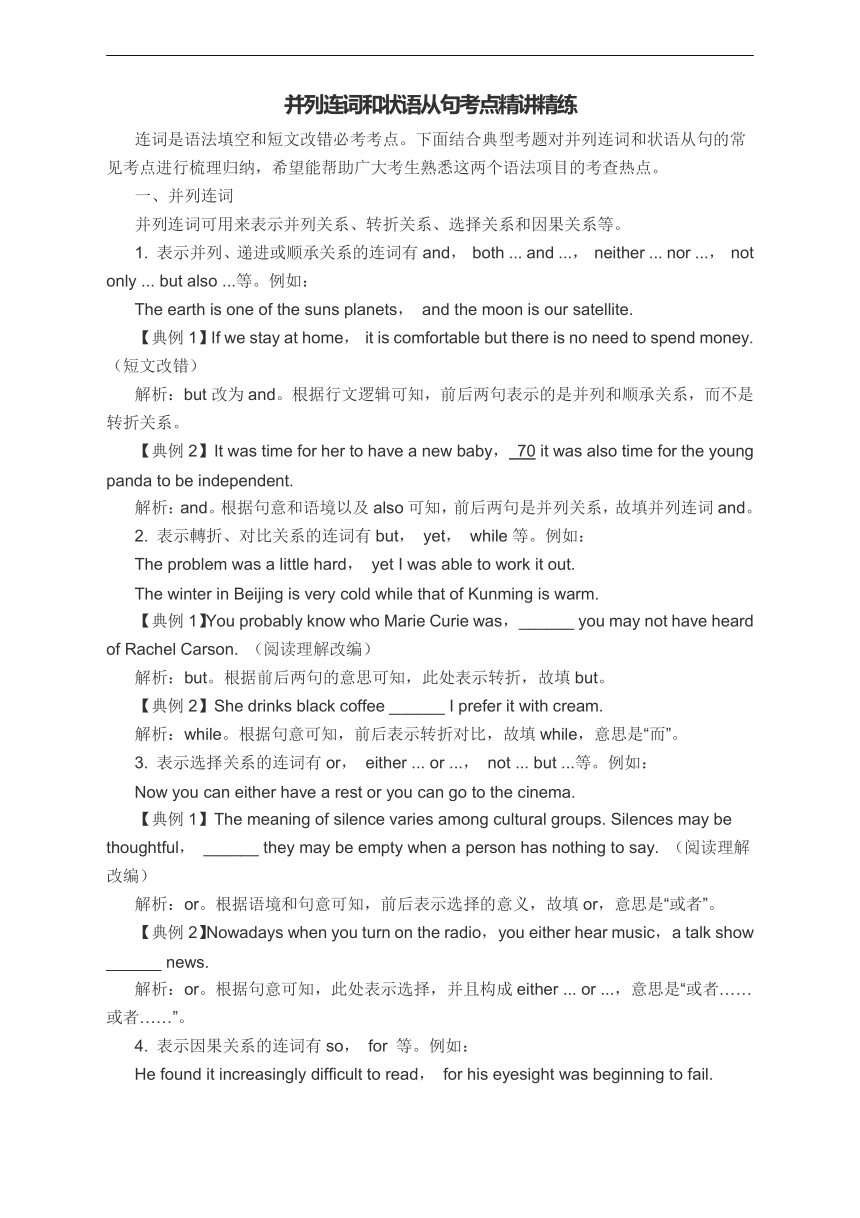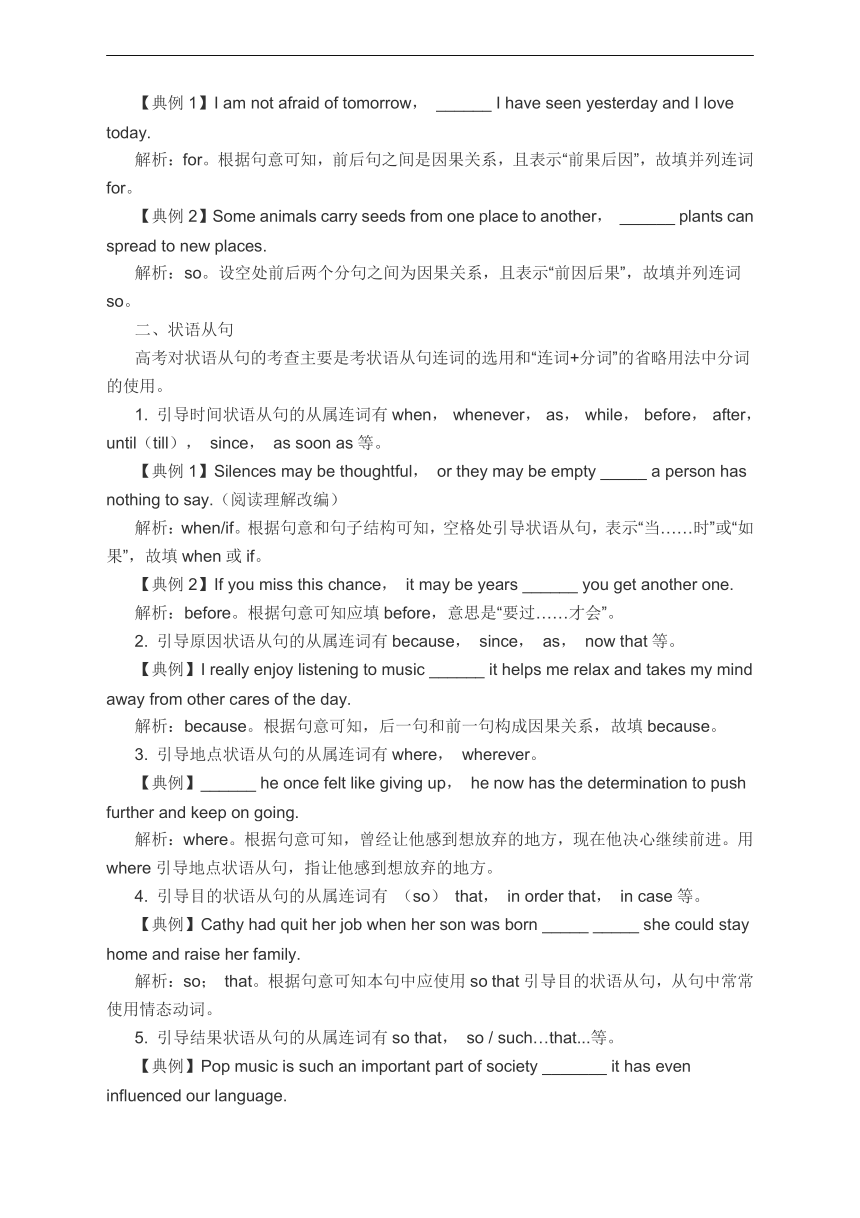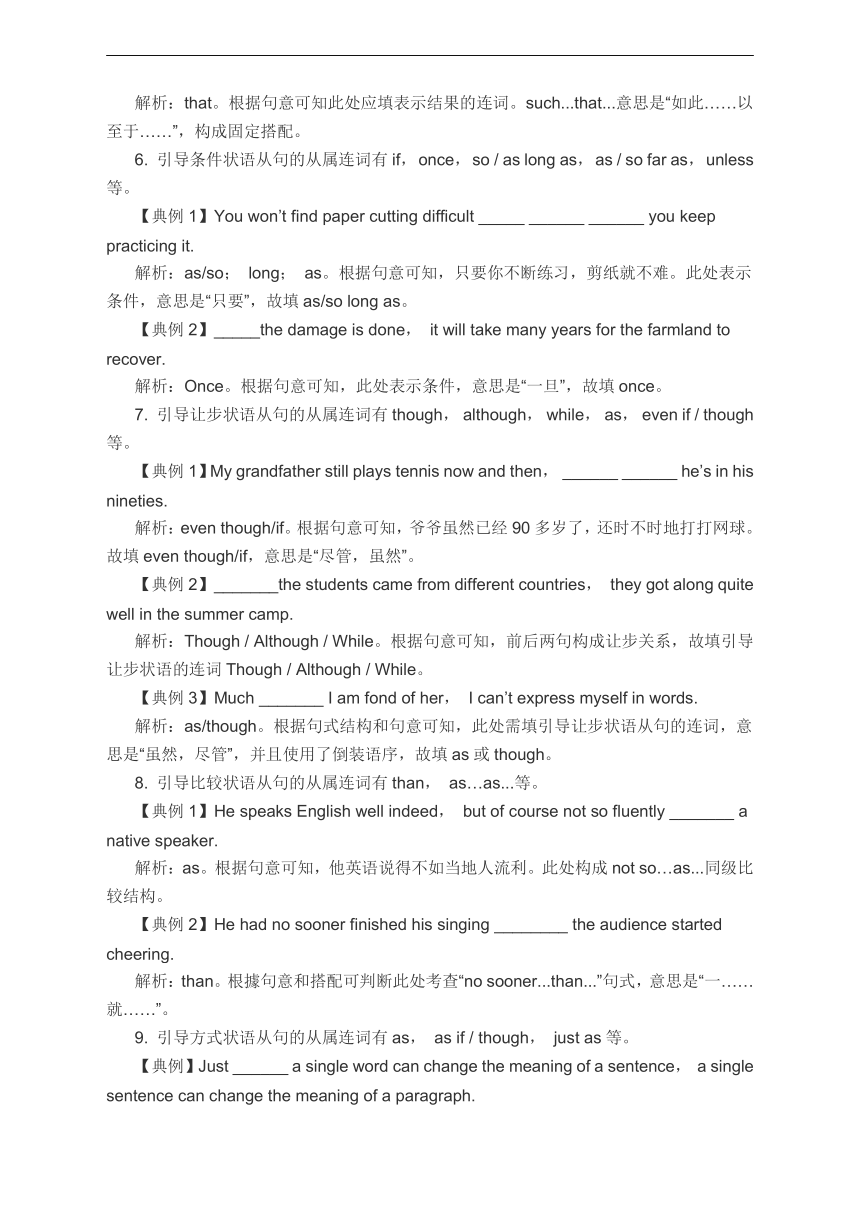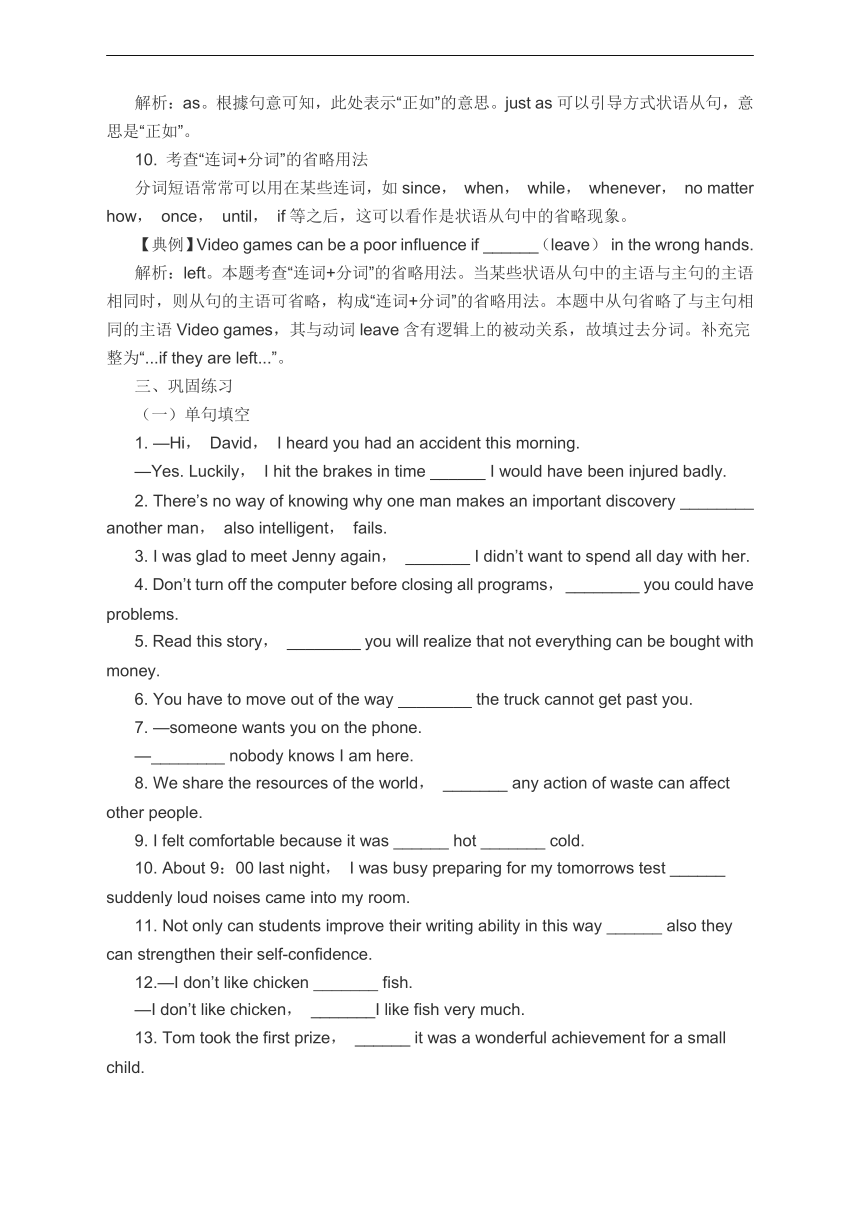2023届高考英语二轮复习 并列连词和状语从句考点精讲精练 讲义--(含答案)
文档属性
| 名称 | 2023届高考英语二轮复习 并列连词和状语从句考点精讲精练 讲义--(含答案) |  | |
| 格式 | docx | ||
| 文件大小 | 25.0KB | ||
| 资源类型 | 教案 | ||
| 版本资源 | 人教版(2019) | ||
| 科目 | 英语 | ||
| 更新时间 | 2022-09-26 12:19:52 | ||
图片预览




文档简介
并列连词和状语从句考点精讲精练
连词是语法填空和短文改错必考考点。下面结合典型考题对并列连词和状语从句的常见考点进行梳理归纳,希望能帮助广大考生熟悉这两个语法项目的考查热点。
一、并列连词
并列连词可用来表示并列关系、转折关系、选择关系和因果关系等。
1. 表示并列、递进或顺承关系的连词有and, both ... and ..., neither ... nor ..., not only ... but also ...等。例如:
The earth is one of the suns planets, and the moon is our satellite.
【典例1】If we stay at home, it is comfortable but there is no need to spend money.(短文改错)
解析:but改为and。根据行文逻辑可知,前后两句表示的是并列和顺承关系,而不是转折关系。
【典例2】It was time for her to have a new baby, 70 it was also time for the young panda to be independent.
解析:and。根据句意和语境以及also可知,前后两句是并列关系,故填并列连词and。
2. 表示轉折、对比关系的连词有but, yet, while等。例如:
The problem was a little hard, yet I was able to work it out.
The winter in Beijing is very cold while that of Kunming is warm.
【典例1】You probably know who Marie Curie was, ______ you may not have heard of Rachel Carson. (阅读理解改编)
解析:but。根据前后两句的意思可知,此处表示转折,故填but。
【典例2】She drinks black coffee ______ I prefer it with cream.
解析:while。根据句意可知,前后表示转折对比,故填while,意思是“而”。
3. 表示选择关系的连词有or, either ... or ..., not ... but ...等。例如:
Now you can either have a rest or you can go to the cinema.
【典例1】The meaning of silence varies among cultural groups. Silences may be thoughtful, ______ they may be empty when a person has nothing to say. (阅读理解改编)
解析:or。根据语境和句意可知,前后表示选择的意义,故填or,意思是“或者”。
【典例2】Nowadays when you turn on the radio, you either hear music, a talk show ______ news.
解析:or。根据句意可知,此处表示选择,并且构成either ... or ...,意思是“或者……或者……”。
4. 表示因果关系的连词有so, for 等。例如:
He found it increasingly difficult to read, for his eyesight was beginning to fail.
【典例1】I am not afraid of tomorrow, ______ I have seen yesterday and I love today.
解析:for。根据句意可知,前后句之间是因果关系,且表示“前果后因”,故填并列连词for。
【典例2】Some animals carry seeds from one place to another, ______ plants can spread to new places.
解析:so。设空处前后两个分句之间为因果关系,且表示“前因后果”,故填并列连词so。
二、状语从句
高考对状语从句的考查主要是考状语从句连词的选用和“连词+分词”的省略用法中分词的使用。
1. 引导时间状语从句的从属连词有when, whenever, as, while, before, after, until(till), since, as soon as等。
【典例1】Silences may be thoughtful, or they may be empty _____ a person has nothing to say.(阅读理解改编)
解析:when/if。根据句意和句子结构可知,空格处引导状语从句,表示“当……时”或“如果”,故填when或if。
【典例2】If you miss this chance, it may be years ______ you get another one.
解析:before。根据句意可知应填before,意思是“要过……才会”。
2. 引导原因状语从句的从属连词有because, since, as, now that等。
【典例】I really enjoy listening to music ______ it helps me relax and takes my mind away from other cares of the day.
解析:because。根据句意可知,后一句和前一句构成因果关系,故填because。
3. 引导地点状语从句的从属连词有where, wherever。
【典例】______ he once felt like giving up, he now has the determination to push further and keep on going.
解析:where。根据句意可知,曾经让他感到想放弃的地方,现在他决心继续前进。用where引导地点状语从句,指让他感到想放弃的地方。
4. 引导目的状语从句的从属连词有 (so) that, in order that, in case等。
【典例】Cathy had quit her job when her son was born _____ _____ she could stay home and raise her family.
解析:so; that。根据句意可知本句中应使用so that引导目的状语从句,从句中常常使用情态动词。
5. 引导结果状语从句的从属连词有so that, so / such…that...等。
【典例】Pop music is such an important part of society _______ it has even influenced our language.
解析:that。根据句意可知此处应填表示结果的连词。such...that...意思是“如此……以至于……”,构成固定搭配。
6. 引导条件状语从句的从属连词有if, once, so / as long as, as / so far as, unless等。
【典例1】You won’t find paper cutting difficult _____ ______ ______ you keep practicing it.
解析:as/so; long; as。根据句意可知,只要你不断练习,剪纸就不难。此处表示条件,意思是“只要”,故填as/so long as。
【典例2】_____the damage is done, it will take many years for the farmland to recover.
解析:Once。根据句意可知,此处表示条件,意思是“一旦”,故填once。
7. 引导让步状语从句的从属连词有though, although, while, as, even if / though等。
【典例1】My grandfather still plays tennis now and then, ______ ______ he’s in his nineties.
解析:even though/if。根据句意可知,爷爷虽然已经90多岁了,还时不时地打打网球。故填even though/if,意思是“尽管,虽然”。
【典例2】_______the students came from different countries, they got along quite well in the summer camp.
解析:Though / Although / While。根据句意可知,前后两句构成让步关系,故填引导让步状语的连词Though / Although / While。
【典例3】Much _______ I am fond of her, I can’t express myself in words.
解析:as/though。根据句式结构和句意可知,此处需填引导让步状语从句的连词,意思是“虽然,尽管”,并且使用了倒装语序,故填as或though。
8. 引导比较状语从句的从属连词有than, as…as...等。
【典例1】He speaks English well indeed, but of course not so fluently _______ a native speaker.
解析:as。根据句意可知,他英语说得不如当地人流利。此处构成not so…as...同级比较结构。
【典例2】He had no sooner finished his singing ________ the audience started cheering.
解析:than。根據句意和搭配可判断此处考查“no sooner...than...”句式,意思是“一……就……”。
9. 引导方式状语从句的从属连词有as, as if / though, just as等。
【典例】Just ______ a single word can change the meaning of a sentence, a single sentence can change the meaning of a paragraph.
解析:as。根據句意可知,此处表示“正如”的意思。just as可以引导方式状语从句,意思是“正如”。
10. 考查“连词+分词”的省略用法
分词短语常常可以用在某些连词,如since, when, while, whenever, no matter how, once, until, if等之后,这可以看作是状语从句中的省略现象。
【典例】Video games can be a poor influence if ______(leave) in the wrong hands.
解析:left。本题考查“连词+分词”的省略用法。当某些状语从句中的主语与主句的主语相同时,则从句的主语可省略,构成“连词+分词”的省略用法。本题中从句省略了与主句相同的主语Video games,其与动词leave含有逻辑上的被动关系,故填过去分词。补充完整为“...if they are left...”。
三、巩固练习
(一)单句填空
1. —Hi, David, I heard you had an accident this morning.
—Yes. Luckily, I hit the brakes in time ______ I would have been injured badly.
2. There’s no way of knowing why one man makes an important discovery ________ another man, also intelligent, fails.
3. I was glad to meet Jenny again, _______ I didn’t want to spend all day with her.
4. Don’t turn off the computer before closing all programs, ________ you could have problems.
5. Read this story, ________ you will realize that not everything can be bought with money.
6. You have to move out of the way ________ the truck cannot get past you.
7. —someone wants you on the phone.
—________ nobody knows I am here.
8. We share the resources of the world, _______ any action of waste can affect other people.
9. I felt comfortable because it was ______ hot _______ cold.
10. About 9:00 last night, I was busy preparing for my tomorrows test ______ suddenly loud noises came into my room.
11. Not only can students improve their writing ability in this way ______ also they can strengthen their self-confidence.
12.—I don’t like chicken _______ fish.
—I don’t like chicken, _______I like fish very much.
13. Tom took the first prize, ______ it was a wonderful achievement for a small child.
14. Were going to the bookstore in Johns car. You can come with us ______ you can meet us there later.
15. Information technology is taught in most schools, ________ we have entered the information society.
16. She is American, _______ she knows little about American history.
17. It’s really very dangerous. One more step, ______ the baby will fall into the well.
18. Li Fang is very busy, _______ she’s always helping others with their lessons.
19. He must like her, ______ he wouldn’t keep calling her.
20. — Coffee _______ milk?
— Only milk, please, _______I used to like coffee.
21. More often, it would be better _______ we don’t pretend we feel strong _______ we are weak or pretend that we are brave when we are scared.
22. ______ all of them are strong candidates, only one will be chosen for the post.
23. I usually do the washing-up and leave the cooking to my wife, _______ she is a better cook than me.
24. No sooner had Mo Yan stepped on the stage _______ the audience broke into thunderous applause.
25. One Friday, we were packing to leave for a weekend away _______ my daughter heard cries for help.
26. _______ football is her main focus, she is also great at basketball.
27. Strange ______ it sounded, his idea was accepted by all the people at the meeting.
28. How long do you think it will be ________ the computer puts forward a new product?
29. They notice that plants don’t grow well ________ there is much shade.
30. The girl sang happily _______ she walked along the lake.
31. The little boy won’t go to sleep ______ his mother tells him a story.
32. John thinks it won’t be long ______ he is ready for his new job.
33. The girl had hardly rung the bell _____ the door was opened suddenly, and her friend rushed out to greet her.
34. The school rules state that no child shall be allowed out of the school during the day, _____ accompanied by an adult.
35. The French football team, the last champion of the world cup, suffered such a defeat ______ the whole world felt greatly shocked.
36. How long is it ______ we last spent the holiday in the country together?
37. If we work with a strong will, we can overcome any difficulty, ______great it is.
38. He always thinks Im wrong, ______I may say.
39. ______ time is gone, you will never get it back.
40. If a lot of people say a film is not good, I won’t bother to see it, or I’ll wait ______ it comes out on DVD.
41. When you read the book, you’d better make a mark _____ you have any questions.
42. It is hard for Greek government to get over the present difficulties ______ it gets more financial support from the European Union.
43. The young couple, who returned my lost wallet, left _______ I could ask for their names.
44. Please call my secretary to arrange a meeting this afternoon, or ______ it is convenient to you.
45. It was April 29, 2001 ______ Prince William and Kate Middleton walked into the palace hall of the wedding ceremony.
46. The new stadium being built for the next Asian Games will be three times as big ______the present one.
47. All the dishes in this menu, ______ otherwise stated, will serve two to three people.
48. Hot ______ the night air was, we slept deeply because we were so tired after the long journey.
49. All people, ______ they are old or young, rich or poor, have been trying their best to help those in need since the disaster.
50. — ______ when has the country been open to international trade?
—1978, I suppose.
(二)语法填空
阅读下面材料,在空白处填入适当的内容(1个单词)或括号内单词的正确形式。
I seldom thought I had a passion. I would sit before the TV all day, thinking 1 nothing but the next shadow. It was not long ago 2 I first learned how important having a passion is to life.
One day I went with Mum to drop my sister off at the gym. Then, 3 Mum stopped at a red light, someone on the roadside caught my eyes. It was a man 4 (dress) in rags, homeless. That didn’t interest me, 5 I had seen many like him before. 6 the man wasn’t sitting down with a sad expression. He had a radio in his hand and was dancing merrily to the music. The radio seemed to be the most precious thing 7 he had.
“Mum, why does that man have a radio even 8 he’s homeless?” I asked.
“He bought it,” she replied.
“But 9 he’s homeless, why doesn’t he use the money to buy food or clothes? He wasted it on something he doesn’t need.”
“Well, Sarah, sometimes food and clothes aren’t the only important things. We need happiness, too.”
“I see.” The man must care too much about music, 10 he bought a radio instead of food and clothes. I realized that happiness is the key to life. Without it, there’s nothing to look forward to. A passion gives a person the happiness they need to keep going!
答案
(一)单句填空
1. or/otherwise。根据对话语境可知,此处表示“否则”,故填or或otherwise。
2. while。前后表示转折对比,故填while。
3. but/yet。根据句意可知,此处表示转折,故填but或yet。
4. or/otherwise。表示“否则”,故填or或otherwise。
5. and。考查“祈使句+and简单句”这一固定句式。
6. or。此处有“否则”的意思,故填or。
7. But。根据对话的情景可知,后一句表示转折,故填But。
8. so。此处表示因果关系,故填so。
9. neither; nor。根据句意可知,此处表示“既不……也不……”,故填“neither… nor...”。
10. when。固定搭配“be doing…when...”,意思是“正在……此时(发生了另一件事)”。
11. but。构成固定搭配“not only…but also...”,意思是“不仅……而且……”。
12. or; but。第一空表示“既不……,也不……”,用“not…or...”;第二空表示转折,故填but。
13. and。前后表示顺承关系,故填and。
14. or。前后表示选择,故填or。
15. for。根据句意可知,前后句之间是因果关系,且表示“前果后因”,故填并列连词for。
16. yet/but。前后表示转折意义,故填yet或but。
17. and。考查固定句式“名词词组+and简单句”的用法。
18. but/yet。前后表示转折意义,故填but或yet。
19. or/otherwise。此处表示“否则”,故填or或otherwise。
20. or; but。第一空表示选择,故填or;第二空表示转折,故填but。
21. if; when。第一空表示假设的条件,意思是“如果”,故填if;第二空意思是“当……的时候”,故填when。
22. Though/Although/While。前后是让步意义,意思是“虽然,尽管”,故填Though或Although或While。
23. because/as。前后两句有因果关系,后一句表示原因,故填because或as。
24. than。此处“no sooner...than...(一……就……)”是固定句式,故填than。
25. when。考查固定句式“be doing…when…(正在……此時……)”。
26. Although/Though/While。前后两句具有让步意义,表示“虽然,尽管”。
27. as/though。引导让步状语从句,表示“虽然,尽管”,并且使用了倒装语序,故填as或though。
28. before。根据句意“要过……才会”可知应填连词before。
29. where。根据句意和句子结构可知,此处引导地点状语从句,应使用where。
30. while/as。引导时间状语从句,表示伴随,故填while或as。
31. unless。此处表示条件,意思是“除非”,故填unless。
32. before。构成固定句型“It won’t be long before...”,意思是“不久就会……”。
33. when/before。构成固定句型“hardly…when/before”,意思是“刚……就……”。
34. unless。根据句意可知,此处表示条件,意思是“除非”,故填unless。
35. that。构成“such…that...”句式,引导结果状语从句。
36. since。构成固定句式“It is+一段时间+since+主语+一般过去时”。意思是“自从……以来已经多久了”。
37. however。引导让步状语从句,并且修饰形容词,应使用however。
38. whatever。引导让步状语从句并且作say的宾语,应使用whatever。
39. Once。根据句意可知,此处表示“一旦”,引导条件状语从句,故填once。
40. until。表示“直到……才……”,引导时间状语从句,故填until。
41. where。表示“在……地方”,引导地点状语从句,故填where。
42. unless。表示条件,意思是“除非”,故填unless。
43. before。根据句意可知,此处引导时间状语从句,表示“还未来得及”或“在……之前”,故填before。
44. whenever。引导时间状语从句,表示“无论何时”,故填whenever。
45. when。此处引导时间状语从句,表示“当……时候”故填when。此题要与强调结构区分开来。如果April 29前有介词on,则是强调结构。
46. as。as…as构成同级比较,第二个as引导比较状语从句。
47. unless。根据句意可知此处表示“除非”,故填unless。
48. as/though。引导让步状语从句,表示“虽然,尽管”,并且使用了倒装语序,故填as或though。
49. whether。此处构成“whether... or...”引导选择范围的让步状语从句,意思是“不管……”。
50. Since。根据答语和问句的时态可知,问句要问的是“自从……时候?”,故填Since。
(二)语法填空
【文章大意】本文通过一位衣衫褴褛、无家可归、食不果腹的男人,买来一个收音机并伴随着音乐翩翩起舞的故事及母女俩的对话,来体现精神食粮、身心健康和激情乐观的重要性。
1.about/of。考查介词的用法。think of/about意为“考虑,思考”,根据句意可知,应填of或about。
2.that。考查固定句式。根据句意可知,此处构成“It was...that...”强调句型,故应填that。
3.as/when。考查状语从句的用法。根据句意可知此处表时间,填as或when,意思是“当……时候”。
4.dressed。考查非谓语动词的用法。根据句式可知此处作定语修饰man,根据dressed的用法可知,表示“穿着”应使用be dressed in,故填dressed。
5.for。考查并列句。此处表示因果关系,并且是前果后因,表示解释说明,故应填for。
6.But。考查并列句。根据对文章意思的理解,此处与上文有转折关系,故应填But。
7.that。考查定语从句的用法。从句中缺少宾语且先行词被最高级修饰,故只能填that。
8.if/though。考查状语从句的用法。根据句意可知此处表示让步,故填if/though,构成even if,意思是“即使,尽管”。
9.if。考查状语从句的用法。根据句意可知,此处表示条件,故用if,意思是“如果”。
10.so。考查并列句的用法。根据句意可以判断此空前后表示因果关系,并且是前因后果,故填so。
连词是语法填空和短文改错必考考点。下面结合典型考题对并列连词和状语从句的常见考点进行梳理归纳,希望能帮助广大考生熟悉这两个语法项目的考查热点。
一、并列连词
并列连词可用来表示并列关系、转折关系、选择关系和因果关系等。
1. 表示并列、递进或顺承关系的连词有and, both ... and ..., neither ... nor ..., not only ... but also ...等。例如:
The earth is one of the suns planets, and the moon is our satellite.
【典例1】If we stay at home, it is comfortable but there is no need to spend money.(短文改错)
解析:but改为and。根据行文逻辑可知,前后两句表示的是并列和顺承关系,而不是转折关系。
【典例2】It was time for her to have a new baby, 70 it was also time for the young panda to be independent.
解析:and。根据句意和语境以及also可知,前后两句是并列关系,故填并列连词and。
2. 表示轉折、对比关系的连词有but, yet, while等。例如:
The problem was a little hard, yet I was able to work it out.
The winter in Beijing is very cold while that of Kunming is warm.
【典例1】You probably know who Marie Curie was, ______ you may not have heard of Rachel Carson. (阅读理解改编)
解析:but。根据前后两句的意思可知,此处表示转折,故填but。
【典例2】She drinks black coffee ______ I prefer it with cream.
解析:while。根据句意可知,前后表示转折对比,故填while,意思是“而”。
3. 表示选择关系的连词有or, either ... or ..., not ... but ...等。例如:
Now you can either have a rest or you can go to the cinema.
【典例1】The meaning of silence varies among cultural groups. Silences may be thoughtful, ______ they may be empty when a person has nothing to say. (阅读理解改编)
解析:or。根据语境和句意可知,前后表示选择的意义,故填or,意思是“或者”。
【典例2】Nowadays when you turn on the radio, you either hear music, a talk show ______ news.
解析:or。根据句意可知,此处表示选择,并且构成either ... or ...,意思是“或者……或者……”。
4. 表示因果关系的连词有so, for 等。例如:
He found it increasingly difficult to read, for his eyesight was beginning to fail.
【典例1】I am not afraid of tomorrow, ______ I have seen yesterday and I love today.
解析:for。根据句意可知,前后句之间是因果关系,且表示“前果后因”,故填并列连词for。
【典例2】Some animals carry seeds from one place to another, ______ plants can spread to new places.
解析:so。设空处前后两个分句之间为因果关系,且表示“前因后果”,故填并列连词so。
二、状语从句
高考对状语从句的考查主要是考状语从句连词的选用和“连词+分词”的省略用法中分词的使用。
1. 引导时间状语从句的从属连词有when, whenever, as, while, before, after, until(till), since, as soon as等。
【典例1】Silences may be thoughtful, or they may be empty _____ a person has nothing to say.(阅读理解改编)
解析:when/if。根据句意和句子结构可知,空格处引导状语从句,表示“当……时”或“如果”,故填when或if。
【典例2】If you miss this chance, it may be years ______ you get another one.
解析:before。根据句意可知应填before,意思是“要过……才会”。
2. 引导原因状语从句的从属连词有because, since, as, now that等。
【典例】I really enjoy listening to music ______ it helps me relax and takes my mind away from other cares of the day.
解析:because。根据句意可知,后一句和前一句构成因果关系,故填because。
3. 引导地点状语从句的从属连词有where, wherever。
【典例】______ he once felt like giving up, he now has the determination to push further and keep on going.
解析:where。根据句意可知,曾经让他感到想放弃的地方,现在他决心继续前进。用where引导地点状语从句,指让他感到想放弃的地方。
4. 引导目的状语从句的从属连词有 (so) that, in order that, in case等。
【典例】Cathy had quit her job when her son was born _____ _____ she could stay home and raise her family.
解析:so; that。根据句意可知本句中应使用so that引导目的状语从句,从句中常常使用情态动词。
5. 引导结果状语从句的从属连词有so that, so / such…that...等。
【典例】Pop music is such an important part of society _______ it has even influenced our language.
解析:that。根据句意可知此处应填表示结果的连词。such...that...意思是“如此……以至于……”,构成固定搭配。
6. 引导条件状语从句的从属连词有if, once, so / as long as, as / so far as, unless等。
【典例1】You won’t find paper cutting difficult _____ ______ ______ you keep practicing it.
解析:as/so; long; as。根据句意可知,只要你不断练习,剪纸就不难。此处表示条件,意思是“只要”,故填as/so long as。
【典例2】_____the damage is done, it will take many years for the farmland to recover.
解析:Once。根据句意可知,此处表示条件,意思是“一旦”,故填once。
7. 引导让步状语从句的从属连词有though, although, while, as, even if / though等。
【典例1】My grandfather still plays tennis now and then, ______ ______ he’s in his nineties.
解析:even though/if。根据句意可知,爷爷虽然已经90多岁了,还时不时地打打网球。故填even though/if,意思是“尽管,虽然”。
【典例2】_______the students came from different countries, they got along quite well in the summer camp.
解析:Though / Although / While。根据句意可知,前后两句构成让步关系,故填引导让步状语的连词Though / Although / While。
【典例3】Much _______ I am fond of her, I can’t express myself in words.
解析:as/though。根据句式结构和句意可知,此处需填引导让步状语从句的连词,意思是“虽然,尽管”,并且使用了倒装语序,故填as或though。
8. 引导比较状语从句的从属连词有than, as…as...等。
【典例1】He speaks English well indeed, but of course not so fluently _______ a native speaker.
解析:as。根据句意可知,他英语说得不如当地人流利。此处构成not so…as...同级比较结构。
【典例2】He had no sooner finished his singing ________ the audience started cheering.
解析:than。根據句意和搭配可判断此处考查“no sooner...than...”句式,意思是“一……就……”。
9. 引导方式状语从句的从属连词有as, as if / though, just as等。
【典例】Just ______ a single word can change the meaning of a sentence, a single sentence can change the meaning of a paragraph.
解析:as。根據句意可知,此处表示“正如”的意思。just as可以引导方式状语从句,意思是“正如”。
10. 考查“连词+分词”的省略用法
分词短语常常可以用在某些连词,如since, when, while, whenever, no matter how, once, until, if等之后,这可以看作是状语从句中的省略现象。
【典例】Video games can be a poor influence if ______(leave) in the wrong hands.
解析:left。本题考查“连词+分词”的省略用法。当某些状语从句中的主语与主句的主语相同时,则从句的主语可省略,构成“连词+分词”的省略用法。本题中从句省略了与主句相同的主语Video games,其与动词leave含有逻辑上的被动关系,故填过去分词。补充完整为“...if they are left...”。
三、巩固练习
(一)单句填空
1. —Hi, David, I heard you had an accident this morning.
—Yes. Luckily, I hit the brakes in time ______ I would have been injured badly.
2. There’s no way of knowing why one man makes an important discovery ________ another man, also intelligent, fails.
3. I was glad to meet Jenny again, _______ I didn’t want to spend all day with her.
4. Don’t turn off the computer before closing all programs, ________ you could have problems.
5. Read this story, ________ you will realize that not everything can be bought with money.
6. You have to move out of the way ________ the truck cannot get past you.
7. —someone wants you on the phone.
—________ nobody knows I am here.
8. We share the resources of the world, _______ any action of waste can affect other people.
9. I felt comfortable because it was ______ hot _______ cold.
10. About 9:00 last night, I was busy preparing for my tomorrows test ______ suddenly loud noises came into my room.
11. Not only can students improve their writing ability in this way ______ also they can strengthen their self-confidence.
12.—I don’t like chicken _______ fish.
—I don’t like chicken, _______I like fish very much.
13. Tom took the first prize, ______ it was a wonderful achievement for a small child.
14. Were going to the bookstore in Johns car. You can come with us ______ you can meet us there later.
15. Information technology is taught in most schools, ________ we have entered the information society.
16. She is American, _______ she knows little about American history.
17. It’s really very dangerous. One more step, ______ the baby will fall into the well.
18. Li Fang is very busy, _______ she’s always helping others with their lessons.
19. He must like her, ______ he wouldn’t keep calling her.
20. — Coffee _______ milk?
— Only milk, please, _______I used to like coffee.
21. More often, it would be better _______ we don’t pretend we feel strong _______ we are weak or pretend that we are brave when we are scared.
22. ______ all of them are strong candidates, only one will be chosen for the post.
23. I usually do the washing-up and leave the cooking to my wife, _______ she is a better cook than me.
24. No sooner had Mo Yan stepped on the stage _______ the audience broke into thunderous applause.
25. One Friday, we were packing to leave for a weekend away _______ my daughter heard cries for help.
26. _______ football is her main focus, she is also great at basketball.
27. Strange ______ it sounded, his idea was accepted by all the people at the meeting.
28. How long do you think it will be ________ the computer puts forward a new product?
29. They notice that plants don’t grow well ________ there is much shade.
30. The girl sang happily _______ she walked along the lake.
31. The little boy won’t go to sleep ______ his mother tells him a story.
32. John thinks it won’t be long ______ he is ready for his new job.
33. The girl had hardly rung the bell _____ the door was opened suddenly, and her friend rushed out to greet her.
34. The school rules state that no child shall be allowed out of the school during the day, _____ accompanied by an adult.
35. The French football team, the last champion of the world cup, suffered such a defeat ______ the whole world felt greatly shocked.
36. How long is it ______ we last spent the holiday in the country together?
37. If we work with a strong will, we can overcome any difficulty, ______great it is.
38. He always thinks Im wrong, ______I may say.
39. ______ time is gone, you will never get it back.
40. If a lot of people say a film is not good, I won’t bother to see it, or I’ll wait ______ it comes out on DVD.
41. When you read the book, you’d better make a mark _____ you have any questions.
42. It is hard for Greek government to get over the present difficulties ______ it gets more financial support from the European Union.
43. The young couple, who returned my lost wallet, left _______ I could ask for their names.
44. Please call my secretary to arrange a meeting this afternoon, or ______ it is convenient to you.
45. It was April 29, 2001 ______ Prince William and Kate Middleton walked into the palace hall of the wedding ceremony.
46. The new stadium being built for the next Asian Games will be three times as big ______the present one.
47. All the dishes in this menu, ______ otherwise stated, will serve two to three people.
48. Hot ______ the night air was, we slept deeply because we were so tired after the long journey.
49. All people, ______ they are old or young, rich or poor, have been trying their best to help those in need since the disaster.
50. — ______ when has the country been open to international trade?
—1978, I suppose.
(二)语法填空
阅读下面材料,在空白处填入适当的内容(1个单词)或括号内单词的正确形式。
I seldom thought I had a passion. I would sit before the TV all day, thinking 1 nothing but the next shadow. It was not long ago 2 I first learned how important having a passion is to life.
One day I went with Mum to drop my sister off at the gym. Then, 3 Mum stopped at a red light, someone on the roadside caught my eyes. It was a man 4 (dress) in rags, homeless. That didn’t interest me, 5 I had seen many like him before. 6 the man wasn’t sitting down with a sad expression. He had a radio in his hand and was dancing merrily to the music. The radio seemed to be the most precious thing 7 he had.
“Mum, why does that man have a radio even 8 he’s homeless?” I asked.
“He bought it,” she replied.
“But 9 he’s homeless, why doesn’t he use the money to buy food or clothes? He wasted it on something he doesn’t need.”
“Well, Sarah, sometimes food and clothes aren’t the only important things. We need happiness, too.”
“I see.” The man must care too much about music, 10 he bought a radio instead of food and clothes. I realized that happiness is the key to life. Without it, there’s nothing to look forward to. A passion gives a person the happiness they need to keep going!
答案
(一)单句填空
1. or/otherwise。根据对话语境可知,此处表示“否则”,故填or或otherwise。
2. while。前后表示转折对比,故填while。
3. but/yet。根据句意可知,此处表示转折,故填but或yet。
4. or/otherwise。表示“否则”,故填or或otherwise。
5. and。考查“祈使句+and简单句”这一固定句式。
6. or。此处有“否则”的意思,故填or。
7. But。根据对话的情景可知,后一句表示转折,故填But。
8. so。此处表示因果关系,故填so。
9. neither; nor。根据句意可知,此处表示“既不……也不……”,故填“neither… nor...”。
10. when。固定搭配“be doing…when...”,意思是“正在……此时(发生了另一件事)”。
11. but。构成固定搭配“not only…but also...”,意思是“不仅……而且……”。
12. or; but。第一空表示“既不……,也不……”,用“not…or...”;第二空表示转折,故填but。
13. and。前后表示顺承关系,故填and。
14. or。前后表示选择,故填or。
15. for。根据句意可知,前后句之间是因果关系,且表示“前果后因”,故填并列连词for。
16. yet/but。前后表示转折意义,故填yet或but。
17. and。考查固定句式“名词词组+and简单句”的用法。
18. but/yet。前后表示转折意义,故填but或yet。
19. or/otherwise。此处表示“否则”,故填or或otherwise。
20. or; but。第一空表示选择,故填or;第二空表示转折,故填but。
21. if; when。第一空表示假设的条件,意思是“如果”,故填if;第二空意思是“当……的时候”,故填when。
22. Though/Although/While。前后是让步意义,意思是“虽然,尽管”,故填Though或Although或While。
23. because/as。前后两句有因果关系,后一句表示原因,故填because或as。
24. than。此处“no sooner...than...(一……就……)”是固定句式,故填than。
25. when。考查固定句式“be doing…when…(正在……此時……)”。
26. Although/Though/While。前后两句具有让步意义,表示“虽然,尽管”。
27. as/though。引导让步状语从句,表示“虽然,尽管”,并且使用了倒装语序,故填as或though。
28. before。根据句意“要过……才会”可知应填连词before。
29. where。根据句意和句子结构可知,此处引导地点状语从句,应使用where。
30. while/as。引导时间状语从句,表示伴随,故填while或as。
31. unless。此处表示条件,意思是“除非”,故填unless。
32. before。构成固定句型“It won’t be long before...”,意思是“不久就会……”。
33. when/before。构成固定句型“hardly…when/before”,意思是“刚……就……”。
34. unless。根据句意可知,此处表示条件,意思是“除非”,故填unless。
35. that。构成“such…that...”句式,引导结果状语从句。
36. since。构成固定句式“It is+一段时间+since+主语+一般过去时”。意思是“自从……以来已经多久了”。
37. however。引导让步状语从句,并且修饰形容词,应使用however。
38. whatever。引导让步状语从句并且作say的宾语,应使用whatever。
39. Once。根据句意可知,此处表示“一旦”,引导条件状语从句,故填once。
40. until。表示“直到……才……”,引导时间状语从句,故填until。
41. where。表示“在……地方”,引导地点状语从句,故填where。
42. unless。表示条件,意思是“除非”,故填unless。
43. before。根据句意可知,此处引导时间状语从句,表示“还未来得及”或“在……之前”,故填before。
44. whenever。引导时间状语从句,表示“无论何时”,故填whenever。
45. when。此处引导时间状语从句,表示“当……时候”故填when。此题要与强调结构区分开来。如果April 29前有介词on,则是强调结构。
46. as。as…as构成同级比较,第二个as引导比较状语从句。
47. unless。根据句意可知此处表示“除非”,故填unless。
48. as/though。引导让步状语从句,表示“虽然,尽管”,并且使用了倒装语序,故填as或though。
49. whether。此处构成“whether... or...”引导选择范围的让步状语从句,意思是“不管……”。
50. Since。根据答语和问句的时态可知,问句要问的是“自从……时候?”,故填Since。
(二)语法填空
【文章大意】本文通过一位衣衫褴褛、无家可归、食不果腹的男人,买来一个收音机并伴随着音乐翩翩起舞的故事及母女俩的对话,来体现精神食粮、身心健康和激情乐观的重要性。
1.about/of。考查介词的用法。think of/about意为“考虑,思考”,根据句意可知,应填of或about。
2.that。考查固定句式。根据句意可知,此处构成“It was...that...”强调句型,故应填that。
3.as/when。考查状语从句的用法。根据句意可知此处表时间,填as或when,意思是“当……时候”。
4.dressed。考查非谓语动词的用法。根据句式可知此处作定语修饰man,根据dressed的用法可知,表示“穿着”应使用be dressed in,故填dressed。
5.for。考查并列句。此处表示因果关系,并且是前果后因,表示解释说明,故应填for。
6.But。考查并列句。根据对文章意思的理解,此处与上文有转折关系,故应填But。
7.that。考查定语从句的用法。从句中缺少宾语且先行词被最高级修饰,故只能填that。
8.if/though。考查状语从句的用法。根据句意可知此处表示让步,故填if/though,构成even if,意思是“即使,尽管”。
9.if。考查状语从句的用法。根据句意可知,此处表示条件,故用if,意思是“如果”。
10.so。考查并列句的用法。根据句意可以判断此空前后表示因果关系,并且是前因后果,故填so。
